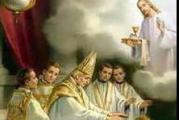What does the word canonized mean? In what case can a person be canonized as a martyr? Criteria indicating that a person can be canonized by the church
It says that canonized saints are God's servants who protect their fellow believers in prayer before the Lord. Believers, in turn, magnify and honor them, honor them in their prayers, pray to them, asking for intercession.
What does canonization mean?
The history of Christianity has many recorded miracles and phenomena that are inexplicable to the average person. Many ascetics of the Christian faith have become famous all over the world for their insight, prophecies and miracles. They are revered, they are prayed to, they are asked for help.
To canonize means to proclaim a church member who has died a saint. Saints are people who during their lifetime were able to completely get rid of and cleanse themselves of their sins, this gave them the strength and opportunity to reveal the power of the Lord through themselves to the world. Saints are those whose life path, which was dedicated to God, is confirmed by the Church as a reliable fact.
To canonize is from Greek means "to legitimize on the basis of a rule", or "to count among the saints". The Orthodox Church celebrates the canonization with a special solemn service in honor of the joyful event - the glorification of the new saint. This procedure has its own rules and laws, takes place in accordance with certain regulations. There is a special Synodal Commission that collects materials that contribute to the canonization.
The practice of the canonization procedure
Previously, when the feat of the martyrs for the faith took place in front of many witnesses, and their remains, becoming relics, were able to heal, the canonization procedure took place immediately, without any commissions and meetings. Now the situation has changed somewhat.
The candidacy for glorification is first considered by the commission of the diocese, of which the person who became famous because of his was a member. After the approval of all the necessary documents, they are transferred to the commission at the Synod, where the final decision is made. The day on which the decision on canonization is made is entered in the church calendar and is considered the day when they glorify the newly-appeared saint. Especially for the newly-appeared saint, a church service is subsequently compiled and an icon is drawn.
Materials confirming the holiness of the righteous
To canonize is to complete a procedure that is based on a petition to reckon with. To make a decision, the commission, in addition to the petition, must consider the full biography of the righteous man, where all his miracles and deeds that testify to holiness will be described in detail.

The biography is compiled on the basis of archival documents: medical certificates of healings, testimonies of clergy and laity about lifetime miracles and pious deeds of the ascetic, archival evidence of his appearances to believers after death or even during his lifetime. A huge role here is played by how the ascetic is revered and glorified by the laity.
Criteria indicating that a person can be canonized by the church
The most important and most important criterion will be the merits of a person before the church parish and before the whole Christian world. The holiness of the righteous can be confirmed by the Church's faith in him, as in a person who was pleasing to God and served the coming of God's son to earth.
Martyrdom for the faith and teachings of Christ also serves as a criterion indicating holiness. They rank as saints in the event of the appearance of miracles to the world, performed through prayer or received as a result of worship of human remains - holy relics. Relics are the remains or completely preserved bodies of the glorified righteous, the appeal to which in prayers works wonders.

To canonize means to recognize that a person has lived a righteous, pious life, because holiness is an example to follow, a feat of martyrdom or great virtues during life.
canonize
canonize, canonize, owls. and nesov. (from Greek kanonizo) (book).
someone something. Count (rank) among the saints (church.).
what. acknowledge (recognize) sth. sacred on behalf of the church (church.). The books of the Hebrew prophets are canonized by the Christian Church.
someone something. To legitimize, recognize (legitimize, recognize) the power of authority for someone, to recognize someone. unshakable. Classicism canonized the "poetics of Boileau".
New explanatory and derivational dictionary of the Russian language, T. F. Efremova.
canonize
nesov. and owls. transition
Recognize as a canon (1), establish as a model.
Approve as canon (2).
Count as saints (in Orthodoxy and Catholicism).
Examples of the use of the word canonize in the literature.
Going beyond canonized waka poetry of the circle of images and themes, haikai poetry introduced into the sphere of aesthetic development what always fell out of this sphere: a ball forgotten on the roof, old shoes in a pond in the rain, not to mention fleas and other insects, which were previously mentioned - no one would have thought of it.
The arrangements of chorales and all sorts of variations were very different from canonized music.
Her canonized under Tsar Alexei Mikhailovich, but after 27 years the veneration of the saint was canceled by the decision of the Council on an absurd occasion - on the icon she is depicted with a hand, the fingers of which are folded into two-fingered, and not three-fingered, as was established by Nikon's church reform.
The most prominent representatives of hesychasm in Byzantium were Gregory of Sinai and Gregory Palamas, posthumously canonized, and in Russia - Sergius of Radonezh.
From this follows an interesting understanding of the artist, the formal method in art history 267 but especially of the photographer as a practical semiotician, who contributes a colossal volume canonized characters to your object.
The Vans felt that they were in shock from the unheard-of, incredible news: there were two living Vans nearby - the hero of songs, the legendary urka, the brilliant kolsky Saturday and canonized during his lifetime, the keeper of the mythical community fund, who spent a quarter in solitary confinement, the apostle of the underworld of prison and freedom - Varlak.
The Man Who Didn't Follow canonized norms of behavior, could not count on the application of the concept of humanity to himself, therefore, it was quite compatible with the spirit of Confucianism to kill a fighter who had violated the rules of his school or the norms of communication with a teacher, since this person was already inferior and could not be considered as a member of a society with own humanity towards others.
The second consisted in the assertion, when the archbishop was taken, that, though he be a heretic, the holy tribunal must turn a blind eye to it, for fear that the German Lutherans canonize him as a martyr, as they did with other persons punished by the Inquisition.
As we have already said, the whole point is that the astronomical content of the paschal contradicts the Scaligerian dating of the Council of Nicaea, at which the paschal was canonized.
It is clear that canonized at the Cathedral, paschalia could only come later.
Hence the addition to the second statement: the year when canonized the paschalia began to take effect, it must have been the First Year of the Great Indiction.
If we agree with these statements, then we will inevitably have to agree with the following: on the basis of the properties of the paschalia and on the basis of these statements, we can verify whether the paschalia was really canonized in 325 a.d.
On the other hand, our intelligentsia, beacon, conscience, brain, victim, - for over fifty years has been engaged in undermining the foundations of the state, canonizes regicides.
Since a person is such by inheritance, all canonized by papal bulls in the spiritual world they are taken out of sight from the rest and hidden in order to deprive them of all communication with those who worshiped them.
CANONIZE
CANONIZE
(from the word canonization). Count as saints.
Dictionary of foreign words included in the Russian language. - Chudinov A.N., 1910 .
CANONIZE
from the word canonization. Count as saints.
Explanation of 25,000 foreign words that have come into use in the Russian language, with the meaning of their roots. - Mikhelson A.D., 1865 .
CANONIZE
perform canonization.
Dictionary of foreign words included in the Russian language. - Pavlenkov F., 1907 .
CANONIZE
to be canonized, canonized.
A complete dictionary of foreign words that have come into use in the Russian language. - Popov M., 1907 .
Canonize
canonize, canonize, owls. and nesov. [from Greek. canonizo] (book). 1. someone. Count (rank) among the saints (church.). || what. Recognize (acknowledge) sth. sacred on behalf of the church (church.). The books of the Hebrew prophets are canonized by the Christian Church. 2. someone. To legitimize, recognize (legitimize, recognize) the power of authority for someone, to recognize someone. unshakable. Classicism canonized the “poetics of Boileau”.
A large dictionary of foreign words. - Publishing house "IDDK", 2007 .
Canonize roar, roar, canonize, zuyu, zuet, nesov. and owls. (fr. canoniser Greek - cm. canon).
1.
what. Recognize (recognize) canon acceptable as canon. TO. theory of three styles in classicism.
2.
whom. For believers: to rank (rank) among the saints, to recognize (recognize) as legalized by the church. TO. Sergius of Radonezh.
Canonization- action on the verb k. 1, 2.
Explanatory Dictionary of Foreign Words L. P. Krysina.- M: Russian language, 1998 .
See what "CANONIZE" is in other dictionaries:
Canonize, legitimize, canonize, legitimize, canonize, create a Dictionary of Russian Synonyms. canonize reckon (rank) among the saints Dictionary of synonyms of the Russian language. Practical guide. M.:… … Synonym dictionary
- (inosk.) consecrate, legitimize, (prop.) rank among the Saints (according to the Roman Church). Wed Canon charter church. Wed κανών rule ... Michelson's Big Explanatory Phraseological Dictionary (original spelling)
CANONIZE, canonize, canonize, sov. and inconsistent. (from Greek kanonizo) (book). 1. whom what. Count (rank) among the saints (church.). || what. Recognize (recognize) something sacred on behalf of the church (church.). Books… … Explanatory Dictionary of Ushakov
CANONIZE, zuyu, zuesh; ovanny and CANONIZE, roar, roar; this; owls. and nesov. Explanatory dictionary of Ozhegov. S.I. Ozhegov, N.Yu. Shvedova. 1949 1992 ... Explanatory dictionary of Ozhegov
canonize- CANONIZE, CANONIZE canoniser, pol. canonizowac. 1. To be included in the church canon, canonized as a saint. BAS 1. Avvakum, of course, canonized by the Old Believers. Kartashev 2 230. 2. Recognize whom l. or what l. unshakably authoritative; ... ... Historical Dictionary of Gallicisms of the Russian Language
canonize- and / roar, and / roar, owls. and nsv. 1) (whom) In Catholicism and Orthodoxy: to rank among the saints, to recognize as legalized by the church. Canonize Sergius of Radonezh. The Catholic Church canonized Joan of Arc (Akhmatova). Synonyms: canonize / t 2) ... Popular dictionary of the Russian language
- (inosk.) consecrate, legitimize, (prop.) rank among the saints (according to the Roman Church) Cf. The canon is the statute of the church. Wed κανών rule ... Michelson's Big Explanatory Phraseological Dictionary
Nesov. and owls. transition 1. Recognize as a canon [canon I 1.], establish as a model. 2. Approve as a canon [canon I 2.]. 3. Count as saints (in Orthodoxy and Catholicism). Explanatory Dictionary of Ephraim. T. F. Efremova. 2000... Modern explanatory dictionary of the Russian language Efremova
canonize- canonize, rue, rue ... Russian spelling dictionary
canonize- (I), canonize / rue, rue, rue ... Spelling Dictionary of the Russian Language
Books
- On the scales of faith. From the Communist Religion to the New "Saints" of Post-Communist Russia, Sergei Lvovich Firsov. The book is devoted to the actual problem of the sacralization of sovereignty - both in Soviet political culture and in the marginal culture of the post-Soviet period. The author examines the cult ...
- On the scales of faith. From the Communist Religion to the New "Saints" of Post-Communist Russia (Deluxe Edition), Sergei Firsov. Stylish gift edition. The book is decorated with gold stamping and lace. The book is devoted to the actual problem of the sacralization of sovereignty - both in Soviet political culture and in ...
And in the Orthodox Churches - the process of canonizing someone as a saint. Ranking among the saints means that the Church testifies to the closeness of these people to God and prays to them as to their patrons.
Orthodoxy
In the practice of the Orthodox Churches, the body authorized to canonize this or that person as a saint is usually the highest legislative body of a given local Church, that is, the Local Council or Synod.
Catholicism
Main article: catholic saints
According to the rules of the Catholic Church, the process of canonization usually begins no earlier than five years after the death of a person. Along with canonization, beatification is also distinguished - reckoning to the ranks of the blessed. The distinction between beatification and canonization was introduced in 1642 by Pope Urban VIII.
literary criticism
- bringing versions of the early text to a single standard
- compilation of a single authoritative text from disparate sources (e.g. canon articles, biblical studies, Chinese classical texts)
Literature
- Khoroshev A.S. Political history of Russian canonization (XI-XVI centuries) / Ed. ed. corresponding member Academy of Sciences of the USSR V. L. Yanin. - M .: Publishing House of Moscow State University, 1986. - 208 p. - 13,400 copies.(in trans.)
Links
- Archpriest Vladislav Tsypin. Canon law. Chapter 48: Canonization and veneration of saints.
- Metropolitan Yuvenaly of Krutitsy and Kolomna On the Synodal Commission of the Russian Orthodox Church for the Canonization of Saints
- Saints and Blessed of the Catholic Church. The largest Russian-language catalog of saints
- List of Catholic saints, blessed and venerable
Wikimedia Foundation. 2010 .
Synonyms:See what "Canonization" is in other dictionaries:
- (new lat. canonisatio, from Greek kanon canon). In the Roman Catholic Church: canonize as a saint. Dictionary of foreign words included in the Russian language. Chudinov A.N., 1910. CANONIZATION Novolatinsk. canonisatio, from Greek. canon, canon. ... ... Dictionary of foreign words of the Russian language
canonization- and, well. Canonization f. , German Canonisation, pol. canonizacyja lat. canonisatio gr. I take something for the rule. 1. Attribution of whom l. to the saints. SIS 1985. Last Saturday the Pope published a decree on the canonization of Saint Margaret of Cortona ... Historical Dictionary of Gallicisms of the Russian Language
Legalization, creation, reckoning Dictionary of Russian synonyms. canonization noun, number of synonyms: 4 beatification (1) ... Synonym dictionary
- (from the Greek kanonizo), in the Catholic and Orthodox churches, the act of classifying a person as a saint ... Modern Encyclopedia
- (from the Greek kanonizo I legitimize) 1) in the Catholic and Orthodox churches, the act of classifying a person as a saint. 2) (Trans.) transformation into an unshakable, mandatory rule, norm, canon; legalization ... Big Encyclopedic Dictionary
CANONIZATION, canonizations, pl. no, female (book). Action under ch. canonize and canonize. Explanatory Dictionary of Ushakov. D.N. Ushakov. 1935 1940 ... Explanatory Dictionary of Ushakov
CANONIZE, zuyu, zuesh; ovanny and CANONIZE, roar, roar; this; owls. and nesov. Explanatory dictionary of Ozhegov. S.I. Ozhegov, N.Yu. Shvedova. 1949 1992 ... Explanatory dictionary of Ozhegov
- (canonisatio, from the Greek verb kanonizein to legalize) legalization, through a special, each time, decision of the highest church authority, honoring the church of the deceased ascetic of faith and piety as a saint. All Christian churches (except Protestants) ... Encyclopedia of Brockhaus and Efron
- (from the Greek. fcanonizo uzakoyiya) eng. canonization; German Kanonisierung. 1. In the Christian church, reckoning to. l. to the saints. 2. Assignment to. l. to the number of semi-divine beings of heroes. 3. Legalization, transformation to. l. mandatory rules... Encyclopedia of Sociology
The reckoning of a person to the saints in the Orthodox and Catholic churches. Big explanatory dictionary of cultural studies .. Kononenko B.I .. 2003 ... Encyclopedia of cultural studies
- (from the Greek. kanonizo legitimize) 1) in the Catholic and Orthodox churches, the act of classifying a person as a saint; 2) (transl.) transformation into an unshakable, mandatory rule, norm, canon; legalization. Political Science: Dictionary ... ... Political science. Dictionary.
In the Ancient Church, there were frequent cases when people, seeing the sufferings of Christians, their steadfastness in the faith, also caught fire from the fiery faith of the holy martyrs of Christ and confessed themselves to be Christians. And often such people were also worthy of a martyr's crown.
Such situations may still arise. Another thing is, who should people look at now? Do we have in our hearts that fiery faith, that fire of confession that kindled faith in the hearts of non-church people even to death? Over the centuries of Christian history, a quite definite approach to the canonization of martyrs has developed. A person must have faith in Christ, be an Orthodox Christian, not a heretic, not an apostate, and have obedience to the Church. And many, even if they died a violent death for their faith, could not be canonized, since the very act of canonization for them does not have any mystical, sacred content.
Canonization is evidence that the Church recognizes a person's path as correct, and his death crowns this path. His martyrdom is the door to the joyfully jubilant Kingdom of Christ. And, of course, the Church cannot admit that this door to the Kingdom of Christ is opened to those who deliberately perverted the path of Christian life, disobeying church unity or striving to establish some heretical sophistication that brought discord into the purity of the Christian Orthodox faith.
You also need to understand that canonization is not some kind of posthumous act of gratitude to a person, not some sort of promotion in church rank. We will not recognize many of the martyrs until the end of this world, they are hidden from us, but the Lord knows His saints, each of His sufferers. The very act of glorification does not bring any benefit to the saint himself, as some foolishly believe. A few years ago, after the glorification of the royal family, I came across an article in a pseudo-church newspaper where an excessively zealous author enthusiastically wrote: “Finally, after the glorification of the royal martyrs by the Council of Bishops, Tsar Nicholas and his august family received the crowns they have been waiting for all these many decades.” Of course, it’s not worth thinking like that: as if the Lord is waiting for someone here in the earthly Church to hang some signs, some regalia, some crowns ... Has not the Lord already awarded them to His saints before? Therefore, the glorification of the saints, in particular the martyrs, is necessary first of all for us who live here, since the glorified martyr is another landmark for us in our life, another prayer book for us at the throne of God, another witness to Divine truth.
Reading his life, we can find reinforcement in his feat. When it is difficult for us in life, then, reading the biographies of Christ's sufferers, we see how incredibly difficult it was for them than for us. Their problems, difficulties, torment, suffering were incomparable with the small sorrows that we experience on our life path. And this understanding helps us not to fall into despondency and endure our little difficulties properly with Christian patience.
It is also necessary to say in conclusion that for 10 years after the jubilee Bishops' Council, which took place in 2000, when the New Martyrs and Confessors of Russia were glorified, work is underway to identify new and new names for the Church-wide glorification in the face of the New Martyrs. And we know that the commission for the canonization of saints, headed by Metropolitan Juvenaly, very painstakingly checks every investigative case. Often there are such cases: there is a person of a pious life and a good reputation, there are documents about his imprisonment, his execution, but the investigation files contain such protocols of interrogations, where this person slandered others, agreed with the arguments of the investigation, pleaded guilty to some crimes or cooperated with the authorities. In such cases, there is no basis for canonization, although this person also suffered and, perhaps, would have escaped suffering if he had renounced the faith. Perhaps the Lord accepted him as a martyr, perhaps he is praying for us, but until we know God’s definition of this person, until we have other data regarding his steadfastness in faith, his truthfulness and honesty, we cannot glorify him as a martyr. Because glorification is the testimony of the Church that a person lived his life correctly and died correctly. And this is an example for all of us.




